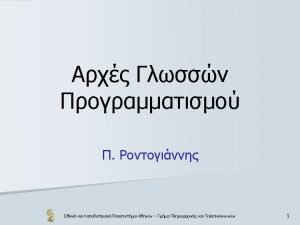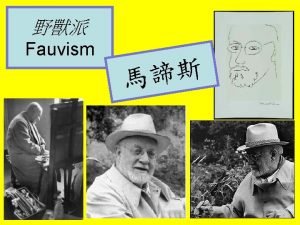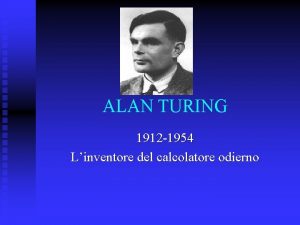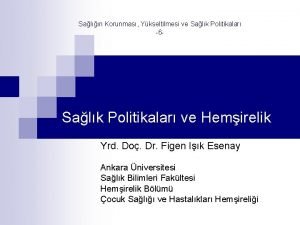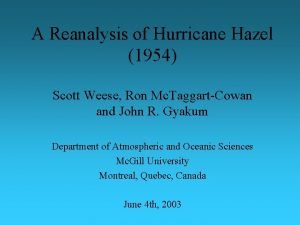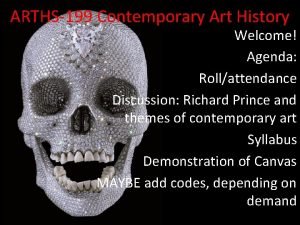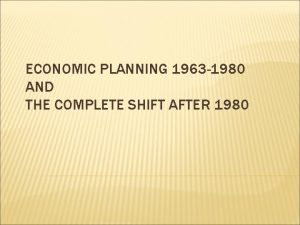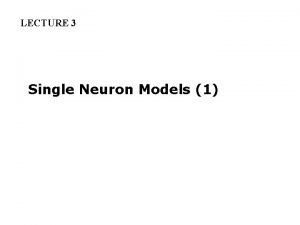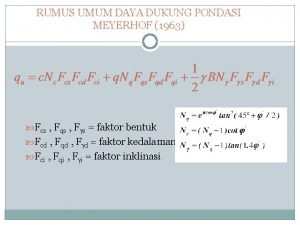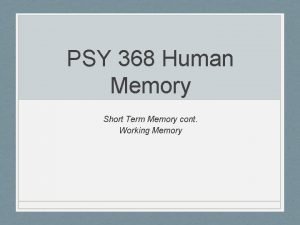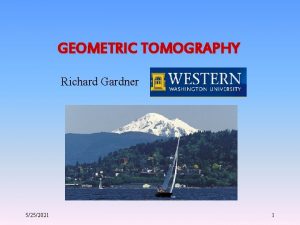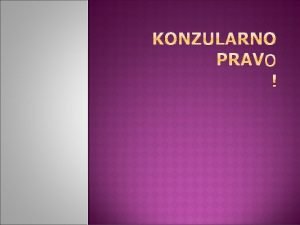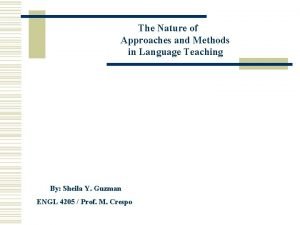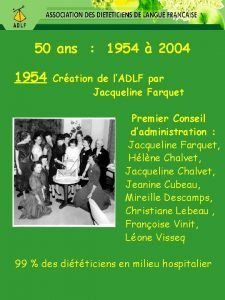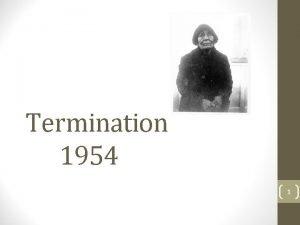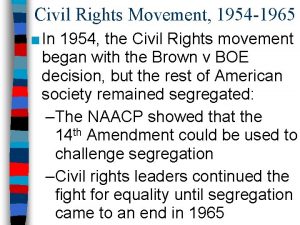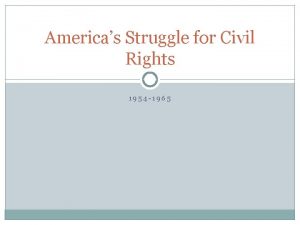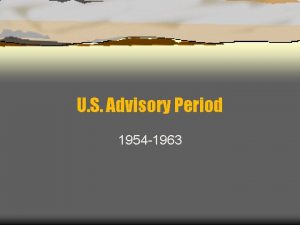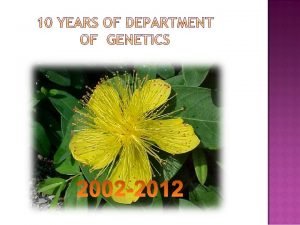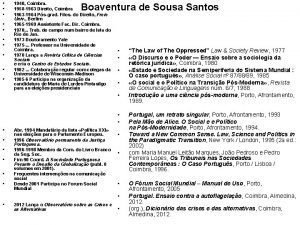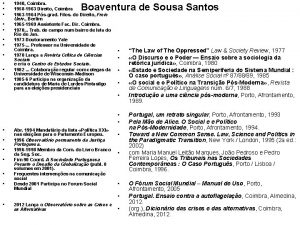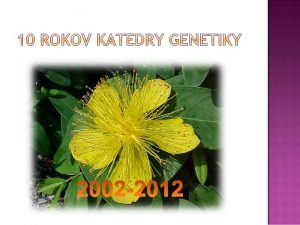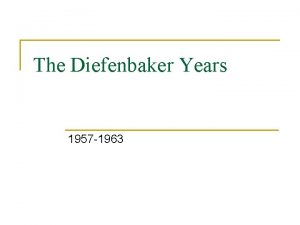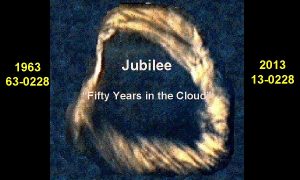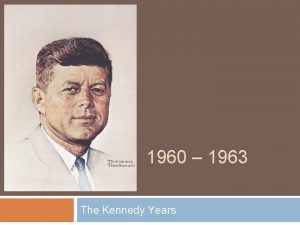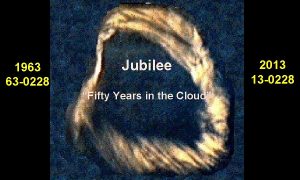The WEIZAC Years 1954 1963 The WEIZAC Years












































- Slides: 44

The WEIZAC Years 1954 -1963

The WEIZAC Years 2

The WEIZAC Years n WEIZmann Automatic Computer. n The first digital computer in Israel. n n WEIZAC was built during the years 1954 -1955, and operated until 1963. It is an early example of successful technology transfer, with the design of von Neumann’s IAS machine moving from the Institute for Advanced Study to the Weizmann Institute. 3

The IAS Machine - JOHNNIAC n n One of the first digital computers. The IAS machine was built during the years 1946 -1952, by von Neumann’s group at the Institute for Advanced Study (IAS), Princeton. Designers of the IAS machine were required to make their plans available to several other government-funded projects. This resulted in the construction of fifteen derivative (but incompatible) computers referred to as the "IAS machines". 4

The “IAS Machines” n ADIVAC (Argonne National Laboratory, 1953). n BESK, SMIL (Stockholm, 1953). n BESM (Moscow, 1953). n CYCLONE (Iowa State University, 1959). n ILLIAC (University of Illinois, 1952). n GEORGE (Argonne National Laboratory, 1957). n JOHNNIAC (Rand Corporation, Santa Monica, California, 1953). n MANIAC (Los Alamos National Laboratory, 1952). n MSUDC, MISTIC (Michigan State University). n ORACLE (Oak Ridge National Laboratory). n ORDVAC (Aberdeen Proving Ground, Maryland, 1951). n SILLIAC (University of Sydney, 1956). n WEIZAC (Weizmann Institute, Israel, 1955). 5

Talk Outline n Chaim L. Pekeris n Introduction n Physical Realization of WEIZAC n Software – Making the Hardware Usable n Scientific Computing on WEIZAC n Impact of the WEIZAC Years n Conclusions 6

Chaim L. Pekeris (1908 -1993( 7

Chaim L. Pekeris n Born in Lithuania, 1908. n 1929: B. Sc. in Mathematics and Meteorology, MIT. n 1934: Ph. D. in Applied Mathematics and Geophysics, MIT. n 1934 -1941: Faculty member at MIT. n 1941 -1945: Division of War Research at Columbia University. 8

Chaim L. Pekeris n n 1945: Asked by Dr. Chaim Weizmann to establish a department of Applied Mathematics at the Weizmann Institute. Pekeris negotiated to build a digital computer for the new department. 1946 -1948: Member of the Institute for Advanced Studies in Princeton, working with von Neumann on computational methods for solving physical problems. 1950 -1978: Chair of the Department of Applied Mathematics at the Weizmann Institute. Died in Rehovot, 1993. 9

Talk Outline n Chaim L. Pekeris n Introduction n Physical Realization of WEIZAC n Software – Making the Hardware Usable n Scientific Computing on WEIZAC n Impact of the WEIZAC Years n Conclusions 10

Introduction In July 1947, an advisory committee was established for the Applied Mathematics Department. Among its members were Albert Einstein and John von Neumann. “Among the issues we discussed was a plan for building an electric computer at the institute, based on the computer JOHNNIAC which was then being designed by von Neumann’s group. Einstein was hesitant (…) but von Neumann’s persuasive powers won Einstein over. Dr. Weizmann assigned $50, 000 for the computer project. It was one fifth of the Weizmann Institute’s total budget then. ” (Pekeris in Estrin, 1991) 11

Introduction In one conversation, von Neumann was asked: “What will that tiny country do with an electric computer? ” He then responded: “Don’t worry about that problem. If nobody else uses the computer, Pekeris will use it full time!” John von Neumann 12

Introduction The primary reason for building WEIZAC, as suggested by Pekeris, was to solve Laplace’s tidal equations for Earth’s oceans with realistic geographical boundaries. Pekeris insisted, however, that the entire scientific community of Israel, including the Defense Ministry, should have access to WEIZAC. In 1952, Gerald Estrin, a member of von Neumann’s group at the IAS, was chosen to lead the WEIZAC project. 13

Gerald Estrin (1921 -( 14

Gerald Estrin n n n Born in New York, 1921. 1951: Ph. D. in Electrical Engineering, University of Wisconsin, Madison. 1951 -1956: Member of von Neumann’s group at the IAS, Princeton. After the completion of the IAS machine, Estrin directed the building of WEIZAC. 1956: Faculty member at UCLA. 1979 -1982, 1985 -1988: Chair of the Computer Science department at UCLA. Has served on the board of governors of the Weizmann Institute since 1971. 15

Gerald Estrin “While traveling through England, the Netherlands, France and Italy we felt ourselves being transported further and further in history. Our arrival in Israel took us back to the birth of Western civilization. (…) When we reached the Weizmann Institute, we found ourselves in an oasis. The grounds of the Weizmann Institute were absolutely beautiful! Flowers, grass and trees abounded. “ (Estrin, 1991) 16

Gerald Estrin “At a cocktail party at the Pekeris home, we met a number of the leading Israeli scientists from the Weizmann Institute, the Technion and the Hebrew University. (…) Except for Pekeris, they thought it was ridiculous to build an electronic computer in Israel. ” (Estrin, 1991) 17

Talk Outline n Chaim L. Pekeris n Introduction n Physical Realization of WEIZAC n Software – Making the Hardware Usable n Scientific Computing on WEIZAC n Impact of the WEIZAC Years n Conclusions 18

Physical Realization of WEIZAC “We arrived in Israel with a complete set of drawings and parts lists. Essentially no materials were available in Israel. As I look back now (…) if we had systematically laid out a detailed plan of execution (…) we would probably have aborted the project. ” (Estrin, 1991) 19

Physical Realization of WEIZAC “My first order of business was hiring staff and then launching into a training process. (…) A group would have to be ready to complete, maintain and operate a production system after we left. ” (Estrin, 1991) n n n A newspaper advertisement resulted in a number of responses. Almost all of the applicants had no records of prior education because those records had been destroyed in the Holocaust or in the emigration process. However, within the technical community in Israel, everyone knew or knew about everybody else. 20

Physical Realization of WEIZAC Members of the WEIZAC group: Gerald and Thelma Estrin Zvi Riesel Yesheyahu Ziegel Micha Kedem David Loewe Ephraim Frei Aviezri Fraenkel George Eisler 21

Physical Realization of WEIZAC The 1959 WEIZAC Manual reports: n n WEIZAC is a digital computer operating on 40 bits words. Control is asynchronous (a signal is generated calling for the next operation). An instruction word contains two 20 -bits orders; 12 bits are used to select addresses, and 8 bits - for the actual order. Memory: 4096 words; 40 bit parallel access; access time – 10 ms. 22

Physical Realization of WEIZAC n Fixed-point arithmetic. A number word consists of a signed digit and 39 number digits. n Addition: 40 ms. n Multiplication: 800 ms. n Division: 850 ms. n Input-Output: Punched paper tape, magnetic tape. 23

Talk Outline n Chaim L. Pekeris n Introduction n Physical Realization of WEIZAC n Software – Making the Hardware Usable n Scientific Computing on WEIZAC n Impact of the WEIZAC Years n Conclusions 24

Software – Making the Hardware Usable An early IAS report, “Planning and Coding of Problems for an Electrical Computing Instrument” (Goldstine & von Neumann, 1948) outlined the need for reusable routines and offered methods to partially automate the programming and coding. By 1951, an extensive library of subroutines had been developed for the IAS machine. However, the changes in order code bits and memory address range prevented programs, written in Princeton, from running directly on WEIZAC. 25

Software – Making the Hardware Usable The Weizmann Institute drew upon emigrants from the west to give them their first start in support of programming. The WEIZAC project provided an opportunity for young mathematicians and engineers to move to Israel without sacrificing their professional careers. In 1954, Pekeris invited Phillip Rabinowitz to join the Weizmann Institute. 26

Phillip Rabinowitz n n 1948: M. S. in Mathematics, University of Pennsylvania. 1948: Whirlwind Computer Project, Numerical Analysis Group, MIT. n 1951: Ph. D. in Mathematics, University of Pennsylvania. n 1951 -1955: National Bureau of Standards. n 1955: Joins the Weizmann Institute. 27

Phillip Rabinowitz Prof. Rabinowitz started writing utility programs for WEIZAC, and developed the technique for calling subroutines. “(…) Every piece of code I found in WEIZAC was written by Pinny Rabinowitz. ” (Accad in Estrin, 1991) During 1955 -1957, he taught the first programming and numerical analysis courses in Israel. Prof. Rabinowitz had a major impact on the kernel of programmers and users who later made mature computations in Israel possible. 28

Software – Making the Hardware Usable “If many subroutines are available to the programmer, his task in programming a particular problem is simplified. Among the types of subroutines prepared are those for evaluation of trigonometric, hyperbolic, exponential, and logarithmic functions, real and complex matrix multiplication, root extraction, quadrature, polynomial evaluation, floating point binary arithmetic, and others. ” (Pekeris, Progress Report, 1955) 29

Talk Outline n Chaim L. Pekeris n Introduction n Physical Realization of WEIZAC n Software – Making the Hardware Usable n Scientific Computing on WEIZAC n Impact of the WEIZAC Years n Conclusions 30

Scientific Computing on WEIZAC Most of the scientific computing on WEIZAC was done by Pekeris, who drove use of his computing instrument through 24 -hour and 7 -day weeks of computation. Pekeris followed the agenda to resolve “unsolved problems in classical physics”. He concurrently attacked four problems: atomic spectroscopy, predicting the tides in the world oceans, terrestrial spectroscopy, and theoretical seismograms. 31

Atomic Spectroscopy “E. Schrodinger was able to solve his wave equation only in the case of the one-electron atom hydrogen. In the case of twoelectron helium, the mathematical difficulties were so formidable that the precision achieved in theoretical term-values lagged behind the measured values. (…) Pekeris developed a new method for the solution of the wave equation in the case of two-electron atoms and obtained, on WEIZAC, term-values of an accuracy exceeding by far the experimental accuracy. ” (Greene in Estrin, 1991) 32

Atomic Spectroscopy In 1962, Pekeris discovered a misidentification of one of the spectral lines of the lithium atom. Pekeris predicted where the correct line should be sought. Later that year, Edlen and Toresson (University of Lund, Sweden), discovered the line in “perfect agreement with Pekeris’ theory”. 33

Other Scientific Computing on WEIZAC n J. Gillis: Numerical solutions of problems in hydrodynamics, and random walk methods. n G. Schmidt: X-ray crystal structure. n P. Rabinowitz: Numerical analysis. 34

Talk Outline n Chaim L. Pekeris n Introduction n Physical Realization of WEIZAC n Software – Making the Hardware Usable n Scientific Computing on WEIZAC n Impact of the WEIZAC Years n Conclusions 35

Impact of the WEIZAC Years n n WEIZAC’s existence, its intense application to physical problems, and the people trained in digital hardware, software, and computational methods opened a market of concepts and practices outside the United States and Europe. The success of WEIZAC led to the recognition of the need for computers and other digital technology in Israel. 36

Impact of the WEIZAC Years n In 1974 there were 391 electronic computers in Israel. n Computing time allocation: 39% accounting 23% research 19% administration 11% economic applications 8% other 37

Impact of the WEIZAC Years However, the WEIZAC project did not create this marketplace directly. In fact, once WEIZAC was executing programs successfully, there was a great deal of hostility expressed towards Pekeris did not put a welcome mat for others to come and use “his” machine. After external users were frustrated in their attempts to get computing time, they demanded that such computing instruments should be brought to Israel. 38

Impact of the WEIZAC Years On December 29, 1963, WEIZAC stopped computing after having accumulated the following life record of computing time and on time (in hours): 39

The GOLEM Decades Construction of the first GOLEM started in April, 1962, and was completed in November, 1963. 40

Talk Outline n Chaim L. Pekeris n Introduction n Physical Realization of WEIZAC n Software – Making the Hardware Usable n Scientific Computing on WEIZAC n Impact of the WEIZAC Years n Conclusions 41

Conclusions n n The WEIZAC project resulted in putting a then-powerful computational instrument in the hands of applied mathematicians, who were driven to take on very serious problems. It succeeded in creating technical knowledge necessary for Israel to play a strong role in the information revolution. 42

Conclusions On February 25, 1993, Pekeris fell on the stairs of his home in Rehovot and died from the trauma of his injuries. On his burial tombstone, in Rehovot, the following was inscribed in Hebrew: "Led and headed the state of Israel to the era of computers" 43

References n n G. Estrin, “The WEIZAC Years (1954 -1963)”, IEEE Annals of the History of Computing, vol. 13, no. 4, pp. 317 -339, 1991. G. Freeman, “C. L. Pekeris - A Biographical Memoir”, National Academy of Sciences, Biographical Memoirs, vol. 85, 2004. 44
 1954 chevrolet bel air
1954 chevrolet bel air Fortran 1954
Fortran 1954 Point o woods old lyme ct
Point o woods old lyme ct Allport 1954
Allport 1954 Magnétoscope 1954
Magnétoscope 1954 Flanagan 1954
Flanagan 1954 Ibm formula 1
Ibm formula 1 Lydia delectorskaya
Lydia delectorskaya Frida kahlo 1907 a 1954
Frida kahlo 1907 a 1954 Muhammad yusuf mehr qolur muhabbat qolur
Muhammad yusuf mehr qolur muhabbat qolur 1954
1954 1970-1954
1970-1954 1975-1954
1975-1954 1954 hemşirelik kanunu
1954 hemşirelik kanunu Ron hubbard 1954
Ron hubbard 1954 Godzilla king of the monsters 1954
Godzilla king of the monsters 1954 Hurricane morgan 1954
Hurricane morgan 1954 What year was ruby bridges born
What year was ruby bridges born 15 th ammendment
15 th ammendment Edward anthony 1963
Edward anthony 1963 Robert morris document 1963
Robert morris document 1963 Tt-ab 700
Tt-ab 700 Georges braque le jour
Georges braque le jour 1980 - 1963
1980 - 1963 Jasper johns
Jasper johns Nobel prize 1963
Nobel prize 1963 Behavioral study of obedience summary
Behavioral study of obedience summary Approach method and technique examples
Approach method and technique examples Tt ab-700 ultra glide record player
Tt ab-700 ultra glide record player Meyerhof 1963
Meyerhof 1963 Winter 1962
Winter 1962 Wickens born & allen (1963)
Wickens born & allen (1963) Milgram 1963
Milgram 1963 Nobel prize 1963
Nobel prize 1963 Alfred du bois
Alfred du bois Becka konvencija o konzularnim odnosima 1963
Becka konvencija o konzularnim odnosima 1963 Edward anthony 1963
Edward anthony 1963 Vin 1963
Vin 1963 1963-1970
1963-1970 D-day birmingham 1963
D-day birmingham 1963 R v gill 1963
R v gill 1963 Omnicom 1963
Omnicom 1963 Watsons dayton ohio
Watsons dayton ohio Equal pay act 1963 summary
Equal pay act 1963 summary Birmingham campaign 1963
Birmingham campaign 1963






